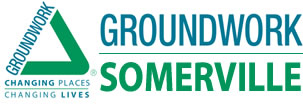Check out the post from Tour de Farms on the Boston Local Food Festival site!
Tour de Farms–Trekking Through Urban Food Treasures
Accustomed to cycling past fields and farms west of I-95, I never imagined navigating the streets of Boston on my bike-until Tour de Farms captured my curiosity. On Sunday, August 1 at 8 am, I gathered with about fifty cyclists on the Boston waterfront in Christopher Columbus Park hours long before tourists and traffic filled the streets.
Mark Smith, a board member of Brookwood Community Farms and one of the ride’s founders, rallied us together and explained the importance of knowing where our food comes from and also how each of us can make choices to eat and grow more local food. At one time people in New England thrived on food they produced and we must renew that commitment to a more sustainable, local existence. During the tour, we would visit five “growing sites” within 10 miles of Boston that were doing their part to provide food and empower people to grow their own. Andrew Prescott, Chief Wheel Officer of Urban AdvenTours, welcomed us to his eco-friendly bike tour company committed to green practices complete with a BioBus sag wagon fueled by vegetable oil.
Andrew’s team of hopscotching leaders escorted us out through the North End and across the Charles into Somerville. We wound our way up and down hills to Vinal Avenue and the Somerville Community Growing Center, a ¼ acre community-based garden rescued by community action from development. This urban oasis now includes a labyrinth, amphitheater, pond, stream, organic garden and orchard with solar powered electricity for lighting and pumps. Volunteers take care of the space and provide opportunities for environmental education and cultural performances. Anyone in the community can pick from the gardens and Red Fire Farm comes weekly to distribute its CSA shares.
We then visited West Somerville Neighborhood School, where Groundwork Somerville has one of its nine Schoolyard Gardens Programs. Jennifer Lawrence, Executive Director of Groundwork Somerville, described the year round in-school and after-school programs where children care for their own school gardens, cook with food they have grown and learn biology, chemistry, math, English, and social studies in a practical, hands-on laboratory. The school gardens have all been built with volunteer labor, and most are located on sites that were previously paved or abandoned.
Flowing like a magic carpet of cyclists, we left Somerville behind and slipped under Route 2 and traveled the Alewife Brook trail to end up beside Belmont High School where folks were fishing in the pond! From there we made our way over to Waltham Fields Community Farm (WFCF), just short of Bentley College at the site of the former UMass Field Station. Executive Director, Claire Kozower greeted us under a large tent dwarfed by 10 acres of open space filled with sustainably managed field crops, gardens and greenhouses.
Claire shared the farm’s mission to promote community farms, support local hunger relief and reconnect people with the knowledge of how food is produced. The farm focuses heavily on hunger relief/food access and education initiatives in addition to offering both summer and winter CSA shares. They offer workshops and classes to the community and volunteers can drop in at 9 am most days of the week to pitch in as long as they wish up until lunchtime. Before leaving, Claire refueled us with sandwiches made from WFCF veggies, Smith Family Farms Cheddar, Westfield Farms Goat Cheeses and Iggy’s bread.
The next stop was Newton Community Farm, two acres divided into quilt-like spaces on the corner of Winchester and Nahantan Street. Farmer Manager Greg Maslowe gave the history of Newton’s last working farm, cultivated continuously for 300 years and saved from development by the formation of this community farm in 2005. Modelling high density urban farming with sustainable growing methods that emphasize long term soil health, every square foot was packed with hand tended plants, bushes and trees. A fruit orchard fit into a space the size of a typical garage and plants were arranged hexagonally in 4’ wide rows to maximize the productivity. In addition to workshops and classes, produce is available through CSA’s, the market stand and a farmer’s market.
Final stop was Allandale Farm in Brookline, a thirty acre farm with a farm stand on site as well as CSA shares with produce, meat, eggs and flowers. Jim Buckle, farm manager, met us and explained the workings of the farm against a backdrop of tomatoes by the cartload. Tomatoes and pumpkins are big items for them and sheep and bees are two other critters that roam the fields. In the summer, the farm offers a weekly outdoor program for children ages 6 – 10 with comprehensive exposure to the outdoors.
From here we returned to Boston via the Arboretum, the Southwest Corridor through Jamaica Plain into South End, Chinatown, Downtown Crossing, the Greenway and voila’- back to the beginning. The City had woken up but with our brigade of Urban AdvenTour leaders clad in black t-shirts holding up traffic at every intersection, it was truly as if we were doing the final lap of the Tour de France. I’d recommend this ride to everyone next year. In the meantime, we are hoping you will find all of these farms at the Festival.
This article written by Fan Watkinson, an organizer of the Boston Local Food Festival and avid recreational cyclist.
Posted by: Fan on August 10, 2010 @ 6:57 am
